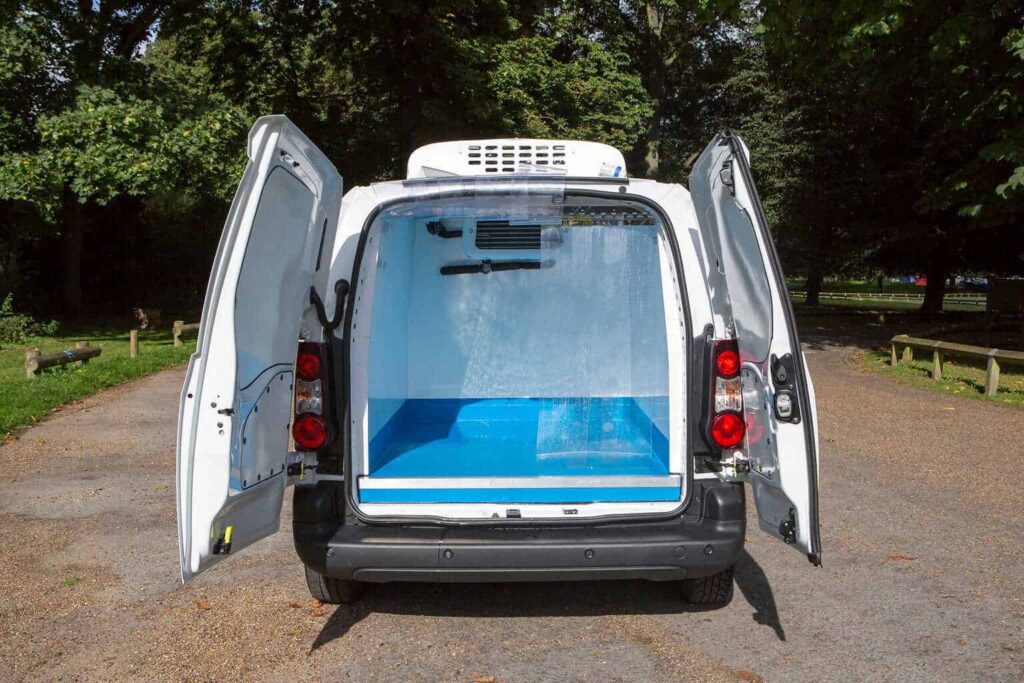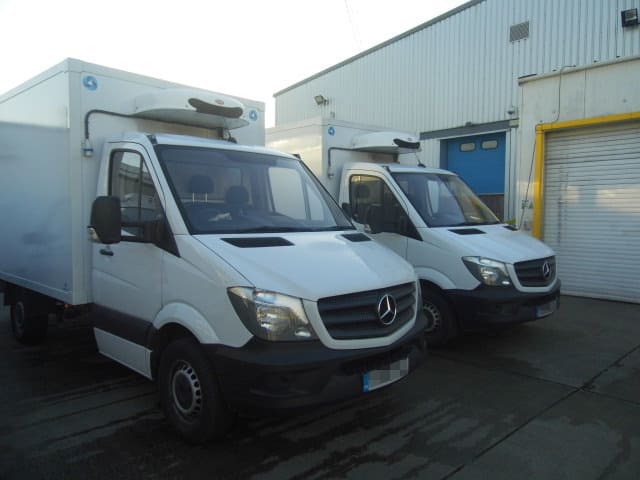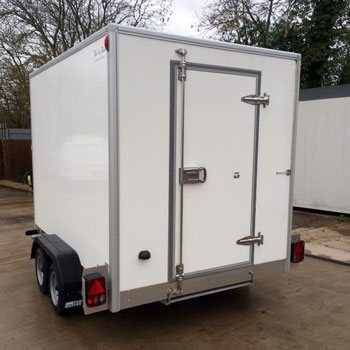Ensuring the safe transportation of pharmaceutical products is paramount to maintaining their efficacy and safety. Refrigerated vans are instrumental in this process, providing temperature-controlled environments to transport sensitive medications and vaccines. In this comprehensive guide, we delve into the critical role of refrigerated vans in pharmaceutical logistics, exploring their functionality, the importance of temperature control, regulatory compliance, and best practices for efficient transportation.
Check out our post: What Questions Should You Ask Before Getting a Refrigerated Van?
The Importance of Temperature Control in Pharmaceutical Transportation
The transportation of pharmaceutical products is complex, primarily due to the stringent requirements for temperature control. This aspect of logistics is not merely a matter of regulatory compliance but a fundamental necessity to ensure the efficacy and safety of the medications being transported.
Among the products most sensitive to temperature variations are vaccines, insulin, and biologics. These items, critical in the treatment and prevention of diseases, can lose their potency or become unsafe for use if exposed to inappropriate temperatures during transit.
Vaccines, for instance, are biological products that can deteriorate if they are not maintained within a specific temperature range, typically between 2°C and 8°C. Any deviation, whether a degree below or above this window, can trigger a loss of immunogenicity, meaning the vaccine may no longer provoke the desired immune response in the body.
Similarly, insulin, a crucial hormone used in the management of diabetes, can degrade when exposed to extreme temperatures, altering its effectiveness. Biologics, a newer class of medications made from living organisms, are particularly susceptible to temperature changes, which can denature the proteins they contain, rendering them ineffective or potentially eliciting adverse reactions in patients.
The consequences of temperature deviations extend beyond the loss of product efficacy. Safety concerns are paramount. For example, a compromised vaccine not only fails to protect against disease but also undermines public trust in vaccination programs. In the case of insulin and biologics, the administration of thermally compromised products can lead to therapeutic failures, worsening of disease states, and in extreme cases, severe adverse effects.
Recognising these risks, regulatory bodies worldwide have established rigorous standards for the transportation of pharmaceutical products.
In the European Union, the Good Distribution Practice (GDP) guidelines serve as a benchmark for the proper distribution of medicinal products for human use. These guidelines encompass a range of criteria, including temperature control measures, to ensure that the quality and integrity of pharmaceuticals are maintained throughout the supply chain. Compliance with GDP standards is not optional but a legal requirement, underscoring the critical role of temperature management in pharmaceutical logistics.
An Overview of Refrigerated Vans
At the heart of a refrigerated van’s functionality is its refrigeration system, which operates to maintain a predetermined temperature range within the cargo area.
This system typically consists of a compressor, condenser, and evaporator, working together to remove heat from the interior of the van and thereby lower the temperature to the required levels.
There are primarily two types of refrigerated vans used in the pharmaceutical industry: those with integrated refrigeration systems and those that are merely insulated.
- Vans with integrated refrigeration systems are equipped with mechanical refrigerators that actively cool the cargo area and are capable of maintaining a consistent temperature, regardless of external weather conditions.
- On the other hand, insulated vans do not have active cooling mechanisms but rely on insulation to slow down the temperature changes. While insulated vans can be useful for short distances or in mild conditions, they are not suitable for long-distance transport of pharmaceuticals that require strict temperature control.
Pharmaceutical-grade refrigerated vans are distinguished by several key features beyond the basic cooling mechanism. These include sophisticated temperature monitoring capabilities, allowing for real-time tracking of internal conditions. Such systems can alert drivers or logistics coordinators to any deviations from the set temperature range, enabling quick corrective action to prevent product spoilage.
Additionally, these vans often come with backup cooling systems to ensure temperature control is maintained even if the primary system fails, and they may have specific compartments with different temperature zones to accommodate various products’ requirements.
Advantages of Using Refrigerated Vans in Pharmaceutical Logistics
The incorporation of refrigerated vans into the pharmaceutical logistics framework offers numerous advantages, ensuring not only the integrity of temperature-sensitive products but also aligning with stringent regulatory standards.
These specialised vehicles stand out the linchpin in maintaining the cold chain, crucial for the delivery of vaccines, insulin, and biologics, among other pharmaceutical products.
Enhanced Product Integrity and Compliance with Regulatory Standards
The primary advantage of using refrigerated vans in pharmaceutical logistics is the heightened ability to maintain product integrity. By providing a controlled environment that keeps medications within their required temperature ranges, these vans ensure that the efficacy of the transported products is preserved.
This is particularly critical for vaccines and biologics, which can lose their effectiveness if exposed to temperatures outside their specified storage conditions. Furthermore, compliance with regulatory standards, such as the Good Distribution Practice (GDP) guidelines, is paramount in the pharmaceutical industry.
Refrigerated vans are equipped with sophisticated monitoring systems that document temperature conditions throughout the transportation process, facilitating adherence to these guidelines and ensuring that products are transported under conditions that meet regulatory approval.
Flexibility and Accessibility in Delivery Routes, Especially to Remote Areas
Refrigerated vans offer unmatched flexibility in delivery routes, making it feasible to transport pharmaceutical products to remote or hard-to-reach areas. This is vital for ensuring that essential medications are accessible across diverse geographical locations, including rural or underserved regions.
The ability of refrigerated vans to navigate various terrains while maintaining the required temperature conditions ensures that no area is too distant when it comes to delivering life-saving drugs.
Cost-Effectiveness in Maintaining the Cold Chain Compared to Other Methods
Compared to other cold chain solutions, refrigerated vans represent a cost-effective option for pharmaceutical logistics. The direct transportation of products from manufacturing sites to distribution centres or pharmacies minimizes the need for expensive warehousing and additional handling, thereby reducing the overall cost of maintaining the cold chain.
This efficiency not only reduces operational costs but also contributes to the sustainability of supply chains by minimizing waste and spoilage of valuable pharmaceutical products.
Examples of Successful Pharmaceutical Distribution Using Refrigerated Vans
During recent global health crises, notably the COVID-19 pandemic, refrigerated vans were instrumental in the rapid and safe distribution of vaccines to vaccination centres across various regions.
These vehicles enabled healthcare providers to initiate timely vaccination campaigns, showcasing their crucial role in public health emergencies.
Another example involves the distribution of insulin, a temperature-sensitive product that requires strict temperature management. Refrigerated vans have successfully transported insulin to pharmacies and healthcare facilities, ensuring that patients receive effective medication without compromise.
The deployment of refrigerated vans in the pharmaceutical industry, while crucial, is not without its challenges. These obstacles range from maintaining consistent temperatures to vehicle breakdowns and efficient route planning.
However, the industry has been proactive in identifying solutions and best practices to mitigate these issues, with technology playing a central role in these strategies.
How to get the best from a Refrigerated Van
Maintaining Consistent Temperatures
One of the primary challenges is ensuring that the internal environment of the van remains within the required temperature range throughout the journey. Fluctuations in external temperatures, improper loading practices, and equipment failures can all contribute to deviations from the desired conditions.
Solution: Advanced monitoring technology is now a staple in refrigerated vans, allowing for real-time tracking of internal temperatures. These systems can send alerts if the temperature deviates from the set range, enabling immediate action to rectify the situation. Additionally, the use of redundant cooling systems ensures that if one system fails, another can take over to maintain temperature control.
Vehicle Breakdowns
Vehicle breakdowns pose a significant risk, especially when transporting time-sensitive or life-saving pharmaceuticals.
Solution: Regular maintenance and pre-trip inspections are vital in preventing breakdowns. Fleet operators are increasingly adopting predictive maintenance strategies, where data analytics are used to forecast potential mechanical issues before they lead to a breakdown.
Efficient Route Planning
Choosing the most efficient routes is essential to minimize transit times and reduce the risk of temperature excursions.
Solution: Strategic route planning, supported by GPS and traffic management systems, helps in selecting the optimal paths for delivery. The integration of real-time data analytics enables dynamic rerouting in response to traffic delays or adverse weather conditions, ensuring timely deliveries.
The Role of Technology
Technology plays a pivotal role in overcoming the challenges faced in using refrigerated vans for pharmaceutical transport. IoT sensors provide a continuous stream of data on vehicle performance and environmental conditions, facilitating proactive management of the cold chain. Real-time data analytics offer insights into operational efficiencies, enabling companies to make informed decisions regarding fleet management, route optimization, and maintenance schedules.
With these technologies and best practices, pharmaceutical companies can enhance the reliability and efficiency of their refrigerated van logistics, ensuring that vital medications reach their destinations safely and effectively.
Why Partner with FridgeXpress?
Partnering with a company that specialises exclusively in refrigerated vans, such as FridgeXpress, presents a multitude of advantages for businesses operating within the pharmaceutical industry and beyond.
The distinctive benefits of engaging with a dedicated provider encompass not only a high level of expertise but also a broad selection of vans and refrigeration solutions, extensive UK coverage, and versatile contract options ranging from short to long-term, including the option to purchase vans outright.
High Level of Expertise
FridgeXpress stands out due to its focused expertise in refrigerated transport solutions. With years of experience dedicated solely to this niche, the company brings an unparalleled depth of knowledge to the table.
This expertise ensures that clients receive informed advice on the best refrigeration solutions for their specific needs, including compliance with industry regulations and the optimal maintenance of temperature-sensitive products.
Wide Choice of Vans and Refrigeration Solutions
The company’s specialised focus allows it to offer an extensive range of refrigerated vans and cooling systems, catering to diverse business requirements.
Whether a small business needs a compact van for local deliveries or a larger enterprise requires a fleet of advanced vehicles for nationwide distribution, FridgeXpress can provide tailored solutions. This variety ensures that businesses can select the most appropriate vehicles for their operations, factoring in size, payload capacity, and refrigeration capabilities.
UK Wide Reach
FridgeXpress’s services span the entirety of the UK, ensuring that businesses across the country can access top-tier refrigerated transport solutions.
This UK-wide reach is particularly beneficial for companies with multi-site operations or those looking to expand their delivery areas. The assurance of reliable refrigerated transport solutions, regardless of location, simplifies logistics planning and execution.
Flexible Contracts
At FridgeXpress we understand that business needs can vary widely, so we ensure we have flexible contract options available for clients who need it. These range from short-term hires, ideal for businesses facing seasonal peaks or testing new markets, to long-term leases and the option to purchase vehicles outright.
This flexibility allows businesses to adapt their fleet size and composition as their requirements evolve, without being locked into commitments that may not align with future needs.
Opportunity to Buy Your Van Outright
For businesses looking for a long-term investment in their logistics capabilities, FridgeXpress provides the option to purchase vans outright. This opportunity is ideal for companies that prefer to own their assets directly, offering long-term cost savings and the ability to customise the vehicle to specific operational requirements.
Working with a specialist provider like FridgeXpress offers significant advantages, including expert guidance, a wide selection of vehicles, nationwide coverage, and flexible contracting options. These benefits combine to ensure that businesses can efficiently manage their refrigerated transport needs, maintaining product integrity and compliance while optimising their logistics operations.
Want to find out more? Visit our main website today and contact our expert team.




